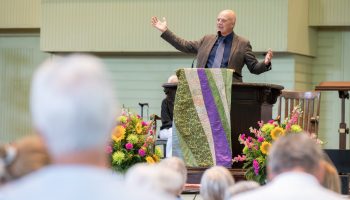
Column by Mary Lee Talbot
It was news to the Rev. Canon Stephanie Spellers that almost half of Gen Z, 13–28 year olds, and almost the same number of millennials, ages 29–44, say the same thing — that they identify as nonreligious. To investigate that information she went to four metropolitan areas across the United States.
“They taught me one word to describe how they feel — longing. The least religious people crave a deeper connection with the sacred. They are the loneliest generations ever. They are saturated with media, marketing and AI, but they want something real,” she said.
Spellers preached at the 9:15 a.m. Tuesday morning worship service in the Amphitheater. Her sermon title was “I Know What I’m Thirsting For,” and the scripture reading was 2 Corinthians 5:14–20.
She began her sermon with a song and invited the congregation to sing along. “Spirit of the living God, fall fresh on me. / Spirit of the living God, fall fresh on me. / Melt me, mold me, fill me, use me. / Spirit of the living God, fall fresh on me.”
The canticle for the service was Psalm 42. Spellers quoted the first two verses. “As a deer longs for flowing streams, / so my soul longs for you, O God. / My soul thirsts for God, / for the living God.”
She continued, “Everywhere these young people turn, someone is telling them what to long for, and someone is trying to sell it to them. They are savvy to consumerism. One young woman told me she found great help in the book How to Do Nothing: Resisting the Attention Economy, by Jenny Odell.”
Odell wrote about how influencers try to keep people’s attention. The young woman said the book helped her to attend to less of the noise and find peace. A 21-year-old from Arkansas told Spellers that life was better for the brain, eyes and heart without a device at hand.
Spellers said, “These young people are finding ways to tune into what is real, what is sacred. All of us consume media, and the media is telling us what we should be seeking, what we deserve. ‘Me’ is at the center, and the media will share more of whatever shores me up. We can chase after that fulfillment, but it will never fill the hole (in our lives) or our longing.”
St. Augustine of Hippo said, “Thou movest us to delight in praising Thee; for Thou hast formed us for Thyself, and our hearts are restless till they find rest in Thee.”
Capitalism, said Spellers, does not want to hear what Augustine said. “The Spirit moves to get ‘me’ out of the way because love is the answer. St. Paul got the memo and passed it on to the Corinthians. He wrote, ‘For the love of Christ urges us on, because we are convinced that one has died for all; therefore all have died. And he died for all, so that those who live might live no longer for themselves but for the one who for their sake died and was raised.’ ”
Scripture helps us to center on God, on the divine web of life instead of the self. “Everything changes,” Spellers said. “Love sees others through God’s eyes, and we see the God in them. The world is knit back together when we reconcile one to another.”
Even in Chautauqua, the divisions of life that color the United States are present. Spellers said, “People of color love and struggle with Chautauqua. It is so white, so old and so privileged. And many of the churches represented here are the same. Young people walk past them because they don’t seem like the real world, not stretched and changed by the world.”
She continued, “We need to practice now. Everyone has a divine spark and story. We are not just here to learn, but we are here on a journey — we are coming home to God. How will we practice reconciling love on this day? How will we resist the forces that pull us apart?”
Spellers told the congregation, “These young people don’t need more devices, more stuff, more walls. They don’t need to be on top. They thirst for people who challenge them and help them grow. They thirst for the living God. They thirst for more love. Amen?” The congregation said, “Amen!”
The Rev. John Morgan, a member of the board of the Presbyterian Association, presided. Sara Toth, editor of The Chautauquan Daily, read the scripture. The prelude, performed by Owen Reyda, organ scholar, on the Massey Memorial Organ, was “Andante con moto,” by Henry Smart. The Motet Choir sang “See, I Make All Things New,” by Alfred V. Fedak, under the direction of Joshua Stafford, director of sacred music and Jared Jacobsen Chair for the Organist, and accompanied by Reyda on the Massey organ. For the postlude, Stafford performed “Processional,” by Samuel Coleridge-Taylor, on the Massey organ. Support for this week’s services and chaplaincy is provided by the John William Tyrrell Endowment for Religion.




